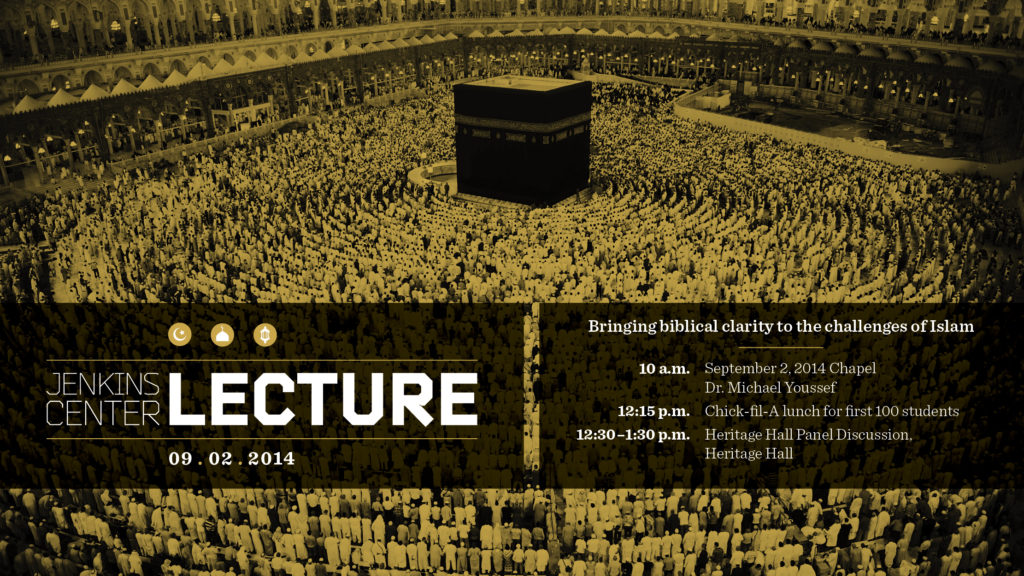The challenge and the promise of a christian understanding of Islam – Part 1
How do we go about articulating a Christian understanding of Islam? What are the distinctives of such an understanding as compared to other understandings? Given that Islam is not a monolithic faith, how do we go about distinguishing between all the variations of Islam current among Muslims themselves? What are the needs of Muslim peoples here…
How do we go about articulating a Christian understanding of Islam? What are the distinctives of such an understanding as compared to other understandings? Given that Islam is not a monolithic faith, how do we go about distinguishing between all the variations of Islam current among Muslims themselves? What are the needs of Muslim peoples here in the US and around the globe? What is God doing among Muslim peoples in drawing them to faith in Christ?
Answering questions such as these is part of the mission of the Jenkins Center for the Christian Understanding of Islam at The Southern Baptist Theological Seminary. In order to begin answering these questions, it is important to root the Center’s mission within the broader framework of God’s redemptive intentions for humanity including Muslims.
The outworking of God’s plan of redemption began over 4,000 years ago with the pronouncement to our father Abraham that his “seed”––the same seed mentioned in Gen 3:15––would be the source of blessing to all the families of the world (cf. Genesis 12:3; 18:18; 22:18; 26:4; 28:14). We know that this seed is the Messiah, Jesus, and that we who believe in him are heirs to these promises by virtue of our position in Christ (cf. Galatians 3:7–16). We also know that our inheritance in Christ comes with certain obligations (and privileges). Among those is our appointment as ambassadors of the gospel for the benefit of every tribe, tongue, people, and nation on the face of the planet. Our inclusion in the multiethnic and multinational Body of Christ as well as the standing mandate we have from Jesus to bequeath our inheritance of faith to other peoples necessitates (and implies) that we will give ourselves to knowing and understanding those to whom we’ve been sent. Christ’s mandate obligates us therefore to articulate a Christian understanding of Islam.
Of the world’s 7+ billion people, 1.7 billion are adherents to some form of Islam. Thus, effective accomplishment of the Great Commission is directly proportional to our level of preparation for service among them; to the extent that we give ourselves earnestly to studying, learning, and engaging Muslim peoples on all levels for their joy and God’s glory. Part of how we go about loving people is by educating ourselves about their histories, beliefs, languages, cultures, likes and dislikes, struggles and aspirations. The Jenkins Center for the Christian Understanding of Islam exists to explore all these facets and the nuances that make up the world of Islam and Muslim cultures. Accomplishing this task effectively as evangelical scholars of Islam begins by recognizing one basic challenge. It is a challenge that, should we succeed in overcoming it, offers the promise of Kingdom fruit. The challenge I’m referring to is a methodological one, and there are two sides to this challenge. In this first part I’ll address one side of the challenge.
As evangelical Baptists we unashamedly seek to draw from––albeit critically––the history of the Christian intellectual tradition––both East and West––in our analysis, assessment, and response to Islam. In light of this reality, the first side of the methodological challenge we face derives from our location in a secular environment with an academic culture that presumes unbiased neutrality when it comes to investigating religions. This environment requires us to explain and defend the legitimacy of a Christian understanding of Islam. While many of the institutes, universities, and divinity schools offering programs and courses in Islamic studies in the West are beset by the postmodern epistemological crisis, we at Southern Seminary are not. We know the story in which we all dwell, and we are determined to reflect critically on every sphere of culture and human society in the light of that story. No area of study or realm of inquiry is exempt. The truth of the gospel and the comprehensiveness of the biblical worldview informs our approach to other philosophies, cultures, and faith systems. The gospel norms and shapes our paths of investigation. Moreover, our faith obligates us to be accurate in our descriptions and interpretations of Muslim beliefs and practices since honesty and integrity are values that stem from the core of our worldview.
This side of the methodological challenge for us will be overcome by fostering relationships with Muslims so as to understand how they interpret their faith, and by immersing ourselves in Islamic history and the primary sources of Islam––the Qur’ān, ḥadīth, sīra, the sunna (for Sunnis), etc. Our investigations in this regard will be conducted on the basis of established methods of historical inquiry, and our analyses will be normed by our commitment to the authority and sufficiency of Scripture and informed by the Christian intellectual tradition. Granted, this means that we will disagree with our Muslim friends on many issues––theological, ethical, political, cultural––in particular, Islam’s subversion of the grand biblical narrative as revealed in the comprehensive and self-contained story of the Bible. However, as we foster nuanced understandings of how Islam has been understood and practiced, it is our sincere hope that our Muslim friends will come to respect our honest engagement of their tradition.
In the next post I’ll address the second side of the methodological challenge and discuss a promise that awaits us as we work on articulating a Christian understanding of Islam.
_________
J. Scott Bridger serves as the Bill and Connie Jenkins Assistant Professor of World Religions and Islamic Studies. He also serves as the director of the Jenkins center for the Christian Understanding of Islam. You can follow Bridger on twitter at: @jsbridger.



